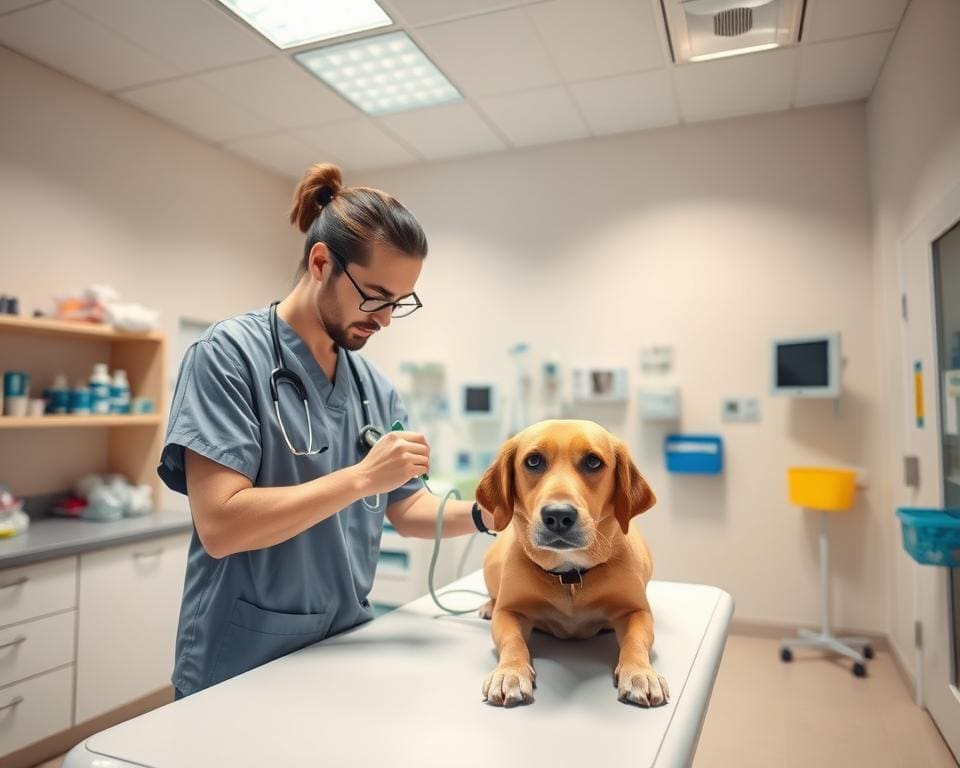The career of a veterinary technician is both rewarding and essential in the realm of animal care. Understanding how much a vet tech makes is crucial for those contemplating this meaningful profession. With the demand for skilled veterinary technicians on the rise, driven by increasing awareness of animal health, the potential for a competitive vet tech salary has never been more promising. According to recent surveys and government labour market statistics, individuals pursuing a career in this field can expect a range of earning opportunities that reflect their dedication and expertise. Joining organisations like the Royal College of Veterinary Surgeons (RCVS) can further enhance career prospects and foster professional growth. As you explore the financial landscape of veterinary technician income, rest assured that your commitment to animal welfare can lead to a fulfilling and financially stable career.
Understanding Vet Tech Salaries in the UK
Veterinary technicians play a vital role in animal healthcare, and understanding their earnings provides insight into this rewarding career. This section delves into the average salaries that vet techs can anticipate in the UK, considering both entry-level positions and those that require a wealth of experience. Factors impacting veterinary technician income reveal a varied landscape of potential earnings.
Overview of Veterinary Technician Income
On average, veterinary technician income in the UK can range significantly based on experience, location, and the type of practice. Entry-level vet techs may start with modest salaries, while those with years of practice and advanced qualifications often enjoy higher pay. The British Veterinary Nursing Association (BVNA) provides valuable salary benchmarks, highlighting the potential for growth within this profession. With dedication, the income from vet tech earnings can progressively increase, demonstrating the value of commitment and expertise in this field.
Factors Influencing Salary Levels
Several elements contribute to the salary variations among veterinary technicians. Key factors include:
- Geographical location: Urban areas often offer higher wages compared to rural settings.
- Type of practice: Working in specialised clinics may provide increased salary potential over general practices.
- Certification and further education: Advanced certifications can lead to better job prospects and higher wages.
Such considerations are essential for those exploring the profession, as they highlight how achieving higher veterinarian assistant wages is possible through strategic career choices and ongoing professional development.

How Much Does A Vet Tech Make
Understanding the specific financial rewards of a veterinary technician role can motivate aspiring professionals. The average vet tech salary varies considerably, reflecting experience, location, and the ongoing demand for skilled workers in the field. Potential candidates should be aware of these variances to make informed decisions about their careers.
Average Salary Figures for Vet Techs
The average salary for a veterinary technician in the UK generally ranges from £20,000 to £28,000 annually. Factors such as experience level and specialisation can lead to a higher compensation package. For those just entering the field, the starting figure tends to align closely with the lower end of this scale, making it essential to evaluate the long-term potential of this career path. The average animal health technician pay reflects similar trends, underscoring the financial benefits of gaining experience over time.
Comparative Analysis of Salaries by Region
Regional disparities play a significant role in determining vet nurse salary. Urban areas like London often offer higher salaries due to the increased cost of living and greater competition for veterinary services. In contrast, rural locations may present lower earnings but often offer a unique work environment that some professionals may find appealing. Key regions and their associated salaries can be summarised as follows:
- London: £24,000 to £35,000
- South East: £22,000 to £30,000
- Midlands: £21,000 to £29,000
- Northern England: £19,000 to £26,000
- Scotland: £20,000 to £27,000
These insights reveal how location influences the overall earnings for veterinary technicians, providing a clearer understanding of what to expect when entering this dynamic field.
The Role of Experience in Vet Tech Earnings
Experience plays a crucial role in determining vet tech earnings. As practitioners gain more years in the field, their skills and responsibilities expand, leading to better compensation packages. Understanding the differences in income levels between entry-level and experienced vet techs helps aspiring professionals set realistic expectations for their careers.
Entry-Level vs Experienced Vet Techs
Newly qualified veterinary technologists often earn a modest salary as they begin their careers. The starting pay range typically reflects the time spent in education and the initial lack of hands-on experience. Conversely, seasoned professionals see a significant increase in veterinary technologist compensation as they demonstrate their capabilities and enhance their knowledge through practical exposure.
- Entry-level vet techs can expect salaries in the lower range, reflecting their novice status.
- Experienced professionals often command higher salaries, with many enjoying well-deserved raises.
The Importance of Continuing Education
Continuous learning not only benefits the quality of care provided but has a direct correlation with enhanced vet tech earnings. Pursuing further qualifications or specialisations further elevates income potential. Ongoing education empowers professionals to elevate their skills, making them more valuable assets within their teams and impacting their veterinary technologist compensation positively.
A commitment to lifelong learning in veterinary technology can inspire a new generation of professionals, encouraging them to thrive in a competitive field. As they invest in their education, they can look forward to the rewards that come with advanced knowledge and practical skills, ultimately leading to higher salaries and fulfilling careers.
Other Variables Affecting Vet Tech Compensation
The path to a rewarding career as a veterinary technician encompasses a variety of elements that can affect compensation. Factors such as specialisations and employment settings significantly influence veterinary technician income. Recognising these aspects can empower aspiring professionals to make informed decisions about their career trajectories.
Specialisations within Veterinary Technology
One of the most impactful variables in determining veterinary technician income is specialisation. Vet techs who pursue additional training in areas such as:
- Emergency and critical care
- Anaesthesia and analgesia
- Dentistry
- Internal medicine
- Behaviour and training
often find themselves enjoying higher salaries. Specialising in such fields not only showcases advanced skills but also positions these professionals as invaluable assets to veterinary practices, enabling them to command a higher wage. The increased responsibility associated with these roles often leads to a notable rise in animal care worker income, affirming the financial benefits of further education and expertise.
Employment Settings and Their Impact on Wages
The type of establishment a veterinary technician chooses to work for can greatly influence their overall compensation. Vet techs in private practices may earn different salaries compared to those in veterinary hospitals, research facilities, or non-profit organisations. Some factors to consider include:
- Private practices typically offer competitive salaries but may have budget constraints.
- Research organisations often provide substantial remuneration, reflecting the advanced skills required.
- Non-profit organisations may compensate less but can offer fulfilment in serving the community.
Understanding the nuances of each employment setting equips professionals with insights to maximise their earning potential. By aligning their career choices with their financial goals, vet techs can embark on a journey that not only benefits their wallets but also enriches their passion for animal care.
Incentives and Benefits for Vet Technicians
A career as a vet tech offers appealing incentives and benefits that extend beyond financial earnings. While understanding vet tech salary and veterinary technologist compensation is essential, many professionals in this field find the non-monetary aspects particularly rewarding. These perks contribute to job satisfaction and fulfilment, making the veterinary profession attractive to those passionate about animal care.
Additional Perks of Being a Vet Tech
Vet technicians often enjoy a variety of benefits that enhance their overall work experience:
- Flexible Working Hours: Many veterinary clinics offer flexible shifts, allowing vet techs to balance work with personal life.
- Career Advancement Opportunities: The field provides numerous paths for professional growth, encouraging further education and specialisation.
- Discounts on Pet Services: Techs frequently benefit from discounts for their pets, fostering a deeper connection with their profession.
- Job Satisfaction: Working closely with animals and their owners often brings a sense of fulfilment that monetary rewards cannot replace.
- Supportive Work Environment: A strong camaraderie forms among veterinary staff, creating a fulfilling workplace culture.
Future Trends in Veterinary Technician Pay
The landscape of vet tech earnings is poised for transformation, influenced by several emerging trends in the veterinary field. One significant driver is the rapid advancement of technology within veterinary sciences. Innovations such as telemedicine and advanced diagnostic tools are making veterinary care more efficient, thereby increasing the demand for skilled professionals who can operate these systems. As a result, future salary prospects for animal health technicians could see a notable rise in alignment with increased responsibilities and enhanced skill requirements.
Additionally, shifts in the animal care services sector are contributing to heightened demand for vet techs. With a growing awareness among pet owners about the importance of regular veterinary care, the industry is experiencing a surge in pet ownership. This trend signifies a broader need for trained technicians, further solidifying the role of animal health technicians in ensuring the well-being of pets. Consequently, those entering the profession can look forward to improved job security and potential financial stability as the market evolves.
Moreover, insights from reputable labour market analysis firms and projections from veterinary associations indicate that veterinary technicians are likely to experience incremental salary growth over the coming years. Economic forecasts related to the veterinary sector suggest that as the demand for quality animal healthcare rises, so will the compensation associated with these essential roles. Embracing continuous education and specialisations will undoubtedly enhance one’s capability to capitalise on these future vet tech earnings, reinforcing a career path that offers both fulfilment and prosperity.









